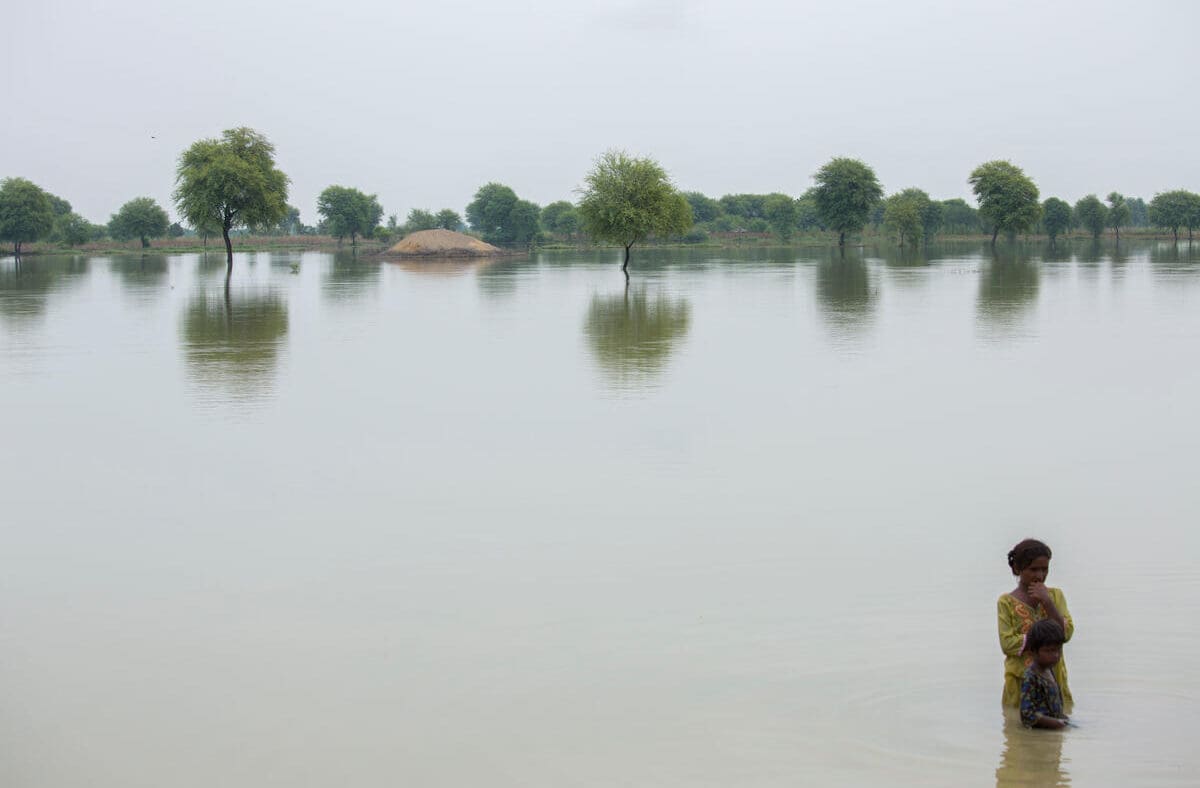
World Food Program USA at SXSW
2° from Disaster
The global hunger crisis is inextricably linked to the climate crisis. No one understands this better than the United Nations World Food Programme, who works on the frontlines every day supporting communities impacted by climate shocks. At South by Southwest 2023, World Food Program USA hosted a lively conversation to examine how climate shocks are driving hunger worldwide and the cutting-edge solutions that the U.N. World Food Programme and partners like Google are deploying to empower communities on the brink.
U.N. World Food Programme Goodwill Ambassador and Emmy and James Beard-award winning chef Andrew Zimmern moderated a discussion withGernot Laganda, Chief of Climate and Disaster Risk Reduction at the U.N. World Food Programme; Alex Diaz, Head of Crisis Response & Humanitarian Aid for Google.org; and Elizabeth Nyamayaro, Special Advisor at the U.N. World Food Programme.
The 3-part conversation discussed the scope of global hunger, particularly those at risk of famine; what technology and innovative solutions are being deployed to combat the effects of extreme weather on the most vulnerable communities; and how we can all do our part to build lasting and sustainable solutions.
Zimmern kicked off the conversation with a sobering stat; today, 1 in 10 people worldwide face severe hunger and our warming climate is putting millions more at risk every day. If average global temperatures rise by just 2°C, 189 million additional people will be at risk of hunger. Ironically, communities that contribute the least to the climate crisis are most affected.
Extreme weather events displace people from their homes, kill livestock, destroy vital infrastructure and farmland and often increase food prices. Communities are then cut off from reliable sources of food, farmers can no longer grow crops and families cannot afford basic meals. What’s worse, once communities slowly start to rebuild, they are often knocked down yet again by another climate-related disaster.
In a call to action for global citizens, Nyamayaro spoke to the moral responsibility we all carry to fight the impact of climate change, reminding us that those who contribute the least to the crisis remain the most impacted.
“We all have a role to play in this,” said Nyamayaro. “It is no longer charity to support those in need, it’s a moral responsibility because we’re all part of creating the problem. Therefore, we have a moral obligation to be a part of the solution.”
The climate crisis is one of the greatest threats to humanity and is a key driver of global hunger. We cannot end hunger without addressing the impact of extreme weather.
While addressing the severe reality of our climate emergency, Laganda said he finds hope within the systems the World Food Programme has built that could be expanded upon to meet the increasing needs of those impacted by extreme weather. Laganda recognized that extreme weather differs from something like the conflict in the Ukraine. “We know whether we will have an El Niño in three to four months or not, we know how heat waves roll out or floods or storms,” said Laganda. “So, the idea here is that we combine several elements in our program to build action plans before the disaster strikes.”
Laying out a three-part strategy, Laganda discussed how we can build better response systems for climate extremes:
“First, restore the natural ecosystems that are the physical and landscape-based protection for people. Second, anticipate the need by providing access to early warning systems, weather forecasts, and climate information. Finally, adding layers of financial protection, either through a publicly run social protection system, a climate risk insurance program or some pre-positioned financing that you put aside so that when one of these early warning triggers fires, you immediately have financing that you do not need to raise beforehand and you can already transfer that that funding to people.”
Alex Diaz’s spoke about Google.org’s longstanding relationship with the U.N World Food Programme. Last year, Google.org issued a three-million-dollar grant trying to build weather forecasting capabilities. From east Africa to Indonesia, Google.org has partnered with the U.N World Food Programme to give vital information to policy makers regarding the climate crisis and how to prepare their agricultural infrastructure. Weather warnings are important because they are used to protect life and property. One of the most impactful partnerships between the World Food Programme and Google.org has focused on developing an early weather forecast system. This system would alert countries across the globe to extreme weather risks prior to the storms. This development is monumental for communities as it would give people time to prepare for disasters, drastically decreasing the impact of extreme weather.
Alex Diaz went on to call on corporations to prioritize community responsibility by making room at the table for every individual impacted by the climate crisis. “By embarking on new projects, we want to put our voices, our capital, our people behind the most important problems of our day – how can we start to get smart on this? We must convene the local community players that need to be at the table when these solutions are being developed. We are corporate citizens; we live in this world. Our employees, and our users, live all over the world and we have a vested interest in making sure that we can be contributing to a better tomorrow.”
Through collaboration, the public and private sectors are co-creating and implementing climate-smart solutions that stabilize not only food systems but local communities and economies as well. Zimmern closed out the panel with a promise of hope, “I believe in the power of human beings to solve this problem. I’ve seen the solutions.” Zimmern ’s extensive fieldwork has shown him the resilience of humanity, the work of the U.N. World Food Programme and the power of hope.
To learn more about these issues, check out our full SXSW event recording:
2° From Disaster
LIVE from SXSW